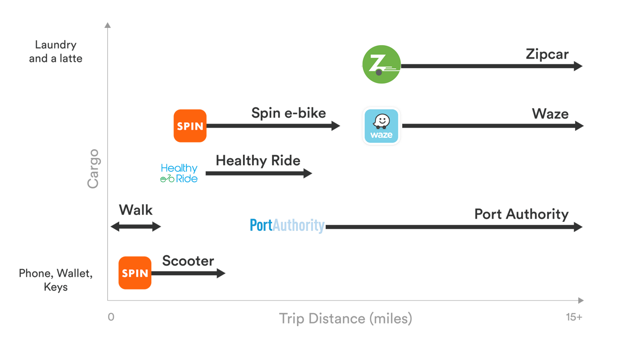A Micromobility Experiment in Pittsburgh Aims to Get People Out of Their Cars

At micromobility locations in Pittsburgh, travelers would find some combination of bike-share stations, Zipcar vehicles, Waze carpool pickup spots, and parked and charged e-bikes and scooters from Spin to rent. Shutterstock
Connecting state and local government leaders
The Pittsburgh Micromobility Collective will create all-in-one mobility hubs near transit stops, to compete with Uber and Lyft and help commuters go car-free.
Last October, a few weeks before thousands of white-collar urban transit professionals descended for a convention of their own, Pittsburgh hosted a different type of transportation summit. Dubbed Mobiliti, it convened city officials, transit technologists, and civil society-types with everyday Pittsburgh residents.
Each person in the last group brought some type of mobility challenge unmet by Pittsburgh’s current bus, light rail, and bikeshare offerings. Some were single mothers traveling with multiple kids. Others were service workers with shifts in the wee hours of the morning. A few were ex-offenders who’d lost their driver’s licenses, working construction jobs in different parts of town. (All received a living wage in compensation for attending.)
At the time, Pittsburgh was on the cusp of launching its first dockless electric bikes, recalls Karina Ricks, the city’s director of transportation, as well as thinking about how to bring dockless electric scooters to its hilly and narrow streets. But hearing from those residents was an affirmation for Ricks that the introduction of a few hundred so-called micromobility devices was not going to make the answer for everyone. “We know that Razors on steroids are not a safe way for a mom to take her kids to school,“ she said. “So while we still wanted them, we also wanted to be able to provide something else to improve that situation.”
Ricks also wanted to do far more to shrink her city’s carbon footprint. Vehicles have overtaken other sectors of the economy as the top source of greenhouse gas emissions, and scientists say that the timeline for averting catastrophic global warming is short.
That knowledge, and the stories at Mobiliti, helped seed Ricks’ idea for what is now the Pittsburgh Micromobility Collective, a self-organized, private consortium that aims to bring a range of “new mobility” services across the city. Led by the dockless bike and scooter startup Spin, the group also includes Zipcar, Ford Mobility, Waze, the scooter parking solution Swiftmile, and the Transit app. Earlier this year, the companies collaborated in response to a request for proposals from Ricks’ department, which called for a complement of car-free transportation options that customers can access and book through a single platform.
Their winning plan, which was one of five submissions, envisions “mobility hubs” clustered near transit stops throughout Pittsburgh. There, travelers would find some combination of bike-share stations, Zipcar vehicles, Waze carpool pickup spots, and parked and charged e-bikes and scooters from Spin to rent. The Transit app would handle route planning and ticketing services to customers, and Ford Mobility would feed data analytics back to the city.
In other cities and other contexts, these companies might be competitors—Zipcar vying for the same trips as Spin; Ford vying for the same trip data as Waze. But each player also recognizes that not all customers are a fit for every mode, said Ben Bear, the chief business officer at Spin. And in this case, they’re aligned around at least one common goal: reducing the 56 percent of commuters in Pittsburgh who drive alone. “This is definitely an experiment to see how we all coalesce, and we don’t know all the answers yet,” Bear said. “But we’re all trying to get people out of single-occupancy cars and personal vehicles.” (In Ford’s case, the company sees an urban market opportunity.)
In return for their cooperation toward this goal, Pittsburgh also is creating certain incentives to encourage these companies to join forces. For one, the city is keeping other mobility competitors out of play for the time being, according to Ricks. And two, her department will work closely with the collective to remove obstacles to their success on the street. “It’s often not a money issue,” she said. “More often, it’s access to parking spaces or operating rights issue that’s the barrier.” That’s the sort of stuff that the city can help negotiate or arrange in order to bring more options to a wider cut of the population.
In late September, the Mobility Collective held its first meeting with the city, the Port Authority of Allegheny County (the mass transit operator in Pittsburgh), and other stakeholder groups to discuss which neighborhoods would make choice destinations for early pilot projects, which could roll out as soon as 2020.
Outside of downtown and university campuses—coveted markets for mobility companies—Ricks pointed to a few communities of potential interest, including Larimer, a historically African American area that is unique in Pittsburgh for its relatively flat topography, and Hazelwood, which is close to employment centers but has poor pedestrian connections to public transit. Each neighborhood has its unique profile and set of challenges; the collective-based approach is supposed to allow the city to experiment.
“It lets us see what people are choosing once they’re given these different offerings,” Ricks said. “They might commute to their day jobs using a micromobility option or Waze carpool, but for weekend grocery shopping, they might use car share.” In neighborhoods where single parents proliferate, the city may also consider bringing a jitney-like service into the fold, she added.

The idea behind the bundled service model is known in industry jargon as “mobility as a service.” Born in Helsinki and gaining popularity in the U.S. and Europe, the MaaS concept is that a single, digital platform that offered seamless, universal access to car-free transportation could become a viable substitute to personal vehicles. In separate bids to become that one-stop mobility shop, ride-hailing bigwigs Uber and Lyft have both recently acquired or experimented with bike, scooter, and car rental services, and redesigned their apps to supply such multi-modal trips. (Some observers worry that they’re becoming “walled gardens” in the process, a concern that came to the fore in a recent dispute between Lyft and the Transit app.) Los Angeles is busy developing an open-source software platform designed to host an ecosystem of mobility companies.
But Pittsburgh’s invitation for multiple companies to develop an integrated system seems to be unique in the landscape. “It’s a first-of-its-kind consortium—the first big group to service the micromobility needs of a big city together,” said Colin Roche, the co-founder and CEO of Swiftmile. On the plus side for the city, it may avoid getting stuck with a single provider. On the down side, there may be risk of competitive interests preventing the players from cooperating down the road.
In Ricks’ mind, the moment has arrived for a bold move on the city’s part. Pittsburgh has learned the hard way that being the first city to welcome emerging mobility companies isn’t always best for residents. A few years ago, it made national headlines for a clash with Uber over whether the company was living up to certain civic promises as it tested autonomous vehicles in town. With dockless scooters and bikes, the city waited a little longer than others to fold them in. This way, Pittsburgh has a clearer idea of what it wants to accomplish, said Ricks.
New and untested as her collective approach may be, Ricks believes that when it comes to shrinking carbon footprints, big ideas will win the day. The time has passed for incrementalism, even if there are bumps in the road. “We’re all a little scared,” she said. “But we’re in it together.”
Laura Bliss is CityLab’s West Coast bureau chief.

NEXT STORY: How state and local government can leverage hybrid cloud


